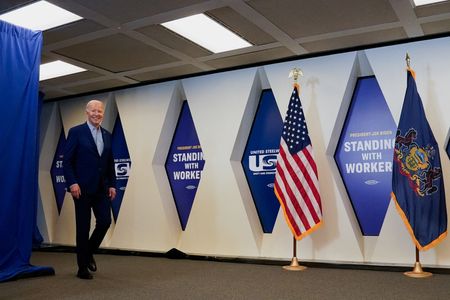By Trevor Hunnicutt, Steve Holland and David Lawder
WASHINGTON/PITTSBURGH (Reuters) -President Joe Biden on Wednesday called for sharply higher U.S. tariffs on Chinese metal products as part of a package of policies aimed at pleasing steelworkers in the swing state of Pennsylvania, at the risk of angering Beijing.
As he campaigned for reelection in the “Steel City” of Pittsburgh, Biden aides said the U.S. president was proposing raising to 25% the tariffs imposed by his predecessor Donald Trump on certain Chinese steel and aluminum products.
“China’s steel companies don’t need to worry about making a profit,” Biden said as he visited the headquarters of the United Steelworkers union. “They’re not competing, they’re cheating and we’ve seen the damage here in America.”
The products now being targeted currently face up to a 7.5% levy under a Trump-era policy under Section 301 of the U.S. trade law, which Biden launched a review of in 2022. The proposed higher tariff rate would apply to more than $1 billion worth of steel and aluminum products, a U.S. official said.
The Biden administration is also pressuring neighboring Mexico to prohibit China from selling its metal products to the United States indirectly from there.
At the same time, it is launching an investigation into Chinese trade practices across the shipbuilding, maritime and logistics sectors, which could lead to more tariffs.
The measures invite blowback from China at a time of already heightened tensions between the world’s two biggest economies.
A spokesperson for China’s embassy in Washington, Liu Pengyu, called the tariffs an “embodiment of unilateralism and protectionism,” adding that the U.S. government was “making the same mistake again and again.”
Trump’s broader imposition of tariffs during his 2017-2021 presidency prompted China’s retaliation with its own levies.
“No trade war,” Biden told reporters traveling with him. But Biden’s trade representative told Congress on Wednesday that there was need for “decisive” action to protect electric vehicles from subsidized Chinese competition, and Reuters reported the administration would also restore some solar tariffs.
Pennsylvania is one of a half-dozen battleground states likely to decide the November election rematch between Biden and Trump. The economy ranks among voters’ top concerns.
Officials said on Wednesday the intervention was “targeted” and should not worsen persistently high inflation.
During an emotional speech in which he also referenced his son Beau, who died of cancer in 2015, Biden said Trump did not deserve to be commander in chief.
KEY VOTING BLOC
Biden and his Republican opponent have each courted union leaders and blue-collar workers in faded industrial hubs who comprise a significant voting bloc in Pennsylvania, Michigan and Nevada, all of them swing states.
The steelworkers union, which sought the measures Biden is adopting, endorsed him last month.
Biden handed the union another win when he came out last month against a proposed $14.9 billion bid by Japan’s Nippon Steel to buy U.S. Steel Corp.
He doubled down on those remarks on Wednesday, telling steelworkers “I promise you” that the company will remain in American hands. U.S. Steel shares were last down 1.4% at $39.74, paring earlier losses.
Both 2024 candidates have sharply departed from the free-trade consensus that once reigned in Washington, capped by China’s joining the World Trade Organization in 2001.
Trump, who withdrew from the would-be Trans-Pacific Partnership trade deal in 2017, has proposed a 10% tariff on all imports if he returns to office.
China was the seventh-largest exporter of steel to the U.S. in 2023, with shipments of 598,000 net tons, down 8.2% from 2022, according to U.S. Census Bureau data compiled by the American Iron and Steel Institute, an industry trade group.
Canada was the top exporter to the U.S., with 6.9 million tons, followed by Mexico, with 4.2 million tons.
Domestic steelmakers shipped 89.3 million net tons of steel in 2023, according to AISI data.
Any new levies on steel and aluminum would be subject to approval by Biden’s trade representative, Katherine Tai, at the completion of the review of the Trump-era tariffs.
The new levies would come on top of 25% Section 232 national security tariffs also imposed by Trump on steel and aluminum products and product-specific anti-dumping and anti-subsidy duties that often reach into the triple-digit percentages.
U.S. Steel and AISI, the steel trade group, praised Biden’s moves on tariffs. The Can Manufacturers Institute said in a statement that the administration “doesn’t go far enough.”
A senior International Monetary Fund official, Era Dabla-Norris, urged the United States to engage with its trading partners and said open trade – not tariffs – were the right approach.
China’s economy grew by a faster-than-expected 5.3% in the first quarter, data showed on Tuesday, as the country has turned to exports to shore up growth in the face of protracted weakness in the property sector and mounting local government debt. Beijing regards Trump-era tariffs as discriminatory.
Officials said they expected Chinese exports to start flooding global markets, concerns raised by Biden Treasury Secretary Janet Yellen on a trip to the country last week.
China exported 25.8 million tons of steel products in the first quarter, the highest for the period since 2016 and a rise of 30.7% year on year, Chinese customs data showed.
(Reporting by Trevor Hunnicutt and David Lawder in Washington and Steve Holland in Pittsburgh; Additional reporting by Andrea Shalal, Aishwarya Jain, Sinead Carew and David Brunnstrom; Editing by Scott Malone, Sonali Paul, Tomasz Janowski and Jonathan Oatis)





